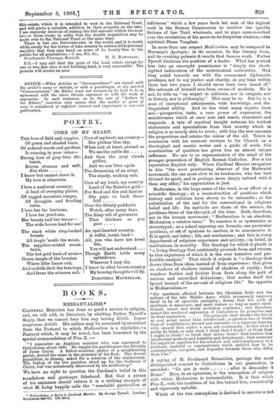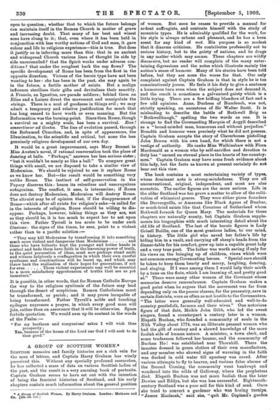BOOKS.
MEDIAEVALISM.* CARDINAL MERCIER has done so good a service to religion, and, we will add, to literature, by eliciting Father Tyrrell's Reply, that we cannot bear him any lasting illwill. Impar
congressus Achilli. His calibre may be measured by an extract from the Pastoral to which Medievalism is a rejoinder,—a
Pastoral which, it may be noted, has been honoured by the special commendation of Pius X. :—
" I remember an Anglican minister who was converted to Catholicism about 1895. He taught his parishioners the Divinity of Jesus Christ. A fellow-minister, pastor of a neighbouring parish, denied the same in the presence of his flock. The devout population, in dismay, asked for a solution of the controversy. The bishop of the two parishes stood up for the Godhead of Christ, but was notoriously disavowed by his archbishop."
We have no right to question the Cardinal's belief in this hcancialoua and grotesque falsehood. But that a person of his eminence should believe it is a striking example of what M. Loisy happily calls the " mentalite particuliere et • medievalism: a Beply to Cardinal Hercior. By George Tyrrell. London: Longman miff Co. [4s. net.] inferieure " which a few years back led men of the highest rank in the Roman Communion to swallow the ignoble fictions of Leo Taxil wholesale, and to gape open-mouthed over the revelations of his never-to-be-forgotten creation,—the mythical Diana Vaughan.
In more than one respect Medievalism may be compared to Newman's Apologia ; in its occasion, its fine literary form, and its crushing polemic it recalls that famous work. Father Tyrrell disclaims the position of a leader. What has pushed him into an unsought prominence is " simply the short- sighted indiscretion of the ecclesiastical authorities. Had they acted towards me with the commonest diplomatic prudence, not to say justice and charity, at any time within these last two years, I should never have been heard of." His estimate of himself errs from excess of modesty. He is not, he tells us, " an expert in criticism, nor in exegesis, nor in history, nor in philosophy." This may be so. But be is a. man of exceptional attainments, wide knowledge, and dis- tinguished ability. And he has what many experts have not,—perspective, taste, a rare power of expression, the sensitiveness which at once acts and reacts, stimulates and responds. A vein of mystical insight redeems his boldest statements and speculations from that novelty which in religion is so nearly akin to error; with him the new assumes the proportions and retains the colour of the old. Taken in connexion with his eminent services to his Church as a theological and ascetic writer and a guide of souls, this combination of qualities has given him an almost unique influence. No one is so representative of the mind of the younger generation of English Roman Catholics. Nor is his reputation English only. When Cardinal Mercier recognises in him "the most penetrating observer of the Modernist movement, the one most alive to its tendencies, who has best divined its spirit, and is perhaps more deeply imbued with it than any other," his appreciation is just.
Modernism, in the large sense of the word, is an effort at a scientific theology ; at a reconstruction of positions which history and criticism have shown to be untenable ; at the substitution of the real for the conventional in religious belief and life. Its methods are those of the science, its problems 'those of the thought, of the time. Both, therefore, are in the human movement : " Medievalism is an absolute, Modernism a relative term." To conceive it as systematic or stereotyped ; as a school opposing one formula, one particular synthesis, or set of opinions to another, is to misconceive it. It is spirit, not letter; life, not mechanism ; and this in every department of religious experience and activity,—in belief, in institutions, in morality. The theology for which it pleads is " a living theology that continually proceeds from and returns to that experience of which it is the ever tentative and per- fectible analysis." That which it rejects is " a theology that draws ideas from ideas instead of from experience ; that gives us shadows of shadows instead of shadows of reality ; that wanders further and further from facts along the path of curious and unverified deductions ; that makes itself the tyrant instead of the servant of religious life." Its opposite is Mediaevalism,— "the synthesis effected between the Christian faith and the culture of the late Middle Ages : which erroneously supposes itself to be of apostolic antiquity; denies that the work of synthesis is necessary, and must endure as long as man's intel- lectual, moral and social evolution continues ; and therefore makes the medieval expression of Catholicism its primitive and its final expression The principle that divides the two is at root moral rather than intellectual ; a question less of truth than of truthfulness, inward and outward—of a vigorous honesty with oneself that makes a man ask continually : Is this what I really do think, or only what I think that I think ? or think that I ought to think ? or think that others think ? that teaches him intellectual modesty and humility and detachment ; that restrains his impatient appetite for the comfort and self-complacency of a certitude (natural or supernatural) which entitles him to be contemptuous, arrogant, and dogmatic towards those who differ from him."
A saying of M. Ferdinand Brunetiere, perhaps the most distinguished convert to Catholicism in our generation, is a recorded : " Ce que je crois allez le demander Rome." Here, in an aphorism, is the conception of religion with which Modernism is irreconcilable. It is that which Pius X., with the tradition of his See behind him, consistently and vigorously upholds.
Which of the two conceptions is destined to survive is not
open to question ; whether that to which the future belongs can maintain itself in the Roman Church is matter of grave and increasing doubt. That many of her best and wisest eons have clung to it; that, even where it has been held in
conjunction with less worthy notions of God and man, it gave colour and life to religious experience—this is true. But does it justify us in inferring more than this: that in an ancient and widespread Church various lines of thought lie side by side unreconciled ? that the Spirit works under adverse con- ditions ? that under the roughest bark the sap flows ? The specific development of Rome has been from the first in the opposite direction. Virtues of the heroic type have not been
wanting to her : she has been in the past, she may again be in the future, a fertile mother of saints. But a malign influence sterilises their gifts and devitalises their sanctity. A Francis, an Ignatius, are parade soldiers; behind them an Elias and a Lainez direct the movement and manipulate the strings. There is a soul of goodness in things evil ; we may admit a temporary and relative justification for much that has long ceased to have worth or even meaning. But the Reformation was the turning-point. Since then Rome, though a survival on a mighty scale, has been a survival. Ecce!
convertimur ad Gentes. The line of evolution passed, through the Reformed Churches, and, in spite of appearances, the Illumination, to the scientific and critical, but none the less genuinely religious development of our own day.
It would be a great improvement, says Mary Bennet in Miss Austen's novel, if rational conversation took the place of dancing at balls. "Perhaps," answers her less serious sister ; "but it wouldn't be nearly so like a ball." To compare great things with small, we are disposed to take a similar view of Modernism. We should be rejoiced to see it replace Rome as we know her. But—the result would be something very unlike Rome. The instinct of self-preservation in the Papacy discerns this : hence its relentless and unscrupulous antagonism. The conflict, it sees, is internecine; if Rome does not destroy Modernism, Modernism will destroy Rome.
The altruist may be of opinion that, if the disappearance of Rome—which after all exists for religion's sake—is called for in the interests of religion, Rome should be. willing to dis- appear. Perhaps, however, taking things as they are, not as they should be, it is too much to expect her to act upon this view. Father Tyrrell is too acute to be under such illusions : the signs of the times, he sees, point to a violent rather than to a pacific solution :—
" They may kill Modernism by transforming it into something much more violent and dangerous than Modernism and those who have hitherto kept the younger and hotter heads in control and bade them have faith in the leavening power of truth, in the quiet permeation of ideas, must now perhaps stand aside and witness helplessly a conflagration in which their own careful syntheses and constructions will be burnt up, and which may throw back the realisation of their hopes for generations, if not for ever These violent experiments may well be essential to a more satisfactory apprehension of truths that are as yet immature."
It is possible, in other words, that for Roman Catholic Europe the way to the religious synthesis of the future may lead through the desert of scepticism. Roman Catholicism must
be transformed, or perish ; and it may prove incapable of being transformed. Father Tyrrell's noble and touching epilogue expresses a prayer, in which every good man will join, rather than an assurance that it will be otherwise. Space forbids quotation. We would sum up its content in the words of the Psalm :-
" For my brethren and companions' sakes I will wish thee prosperity ;
Yea, because of the house of the Lord our God I will seek to do thee good."







































 Previous page
Previous page